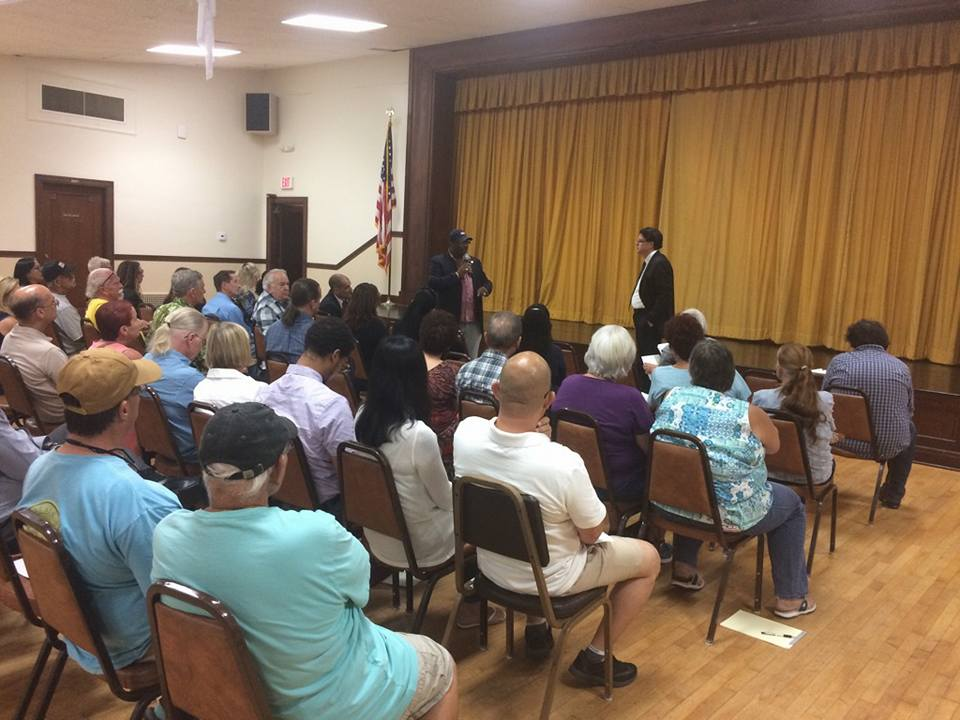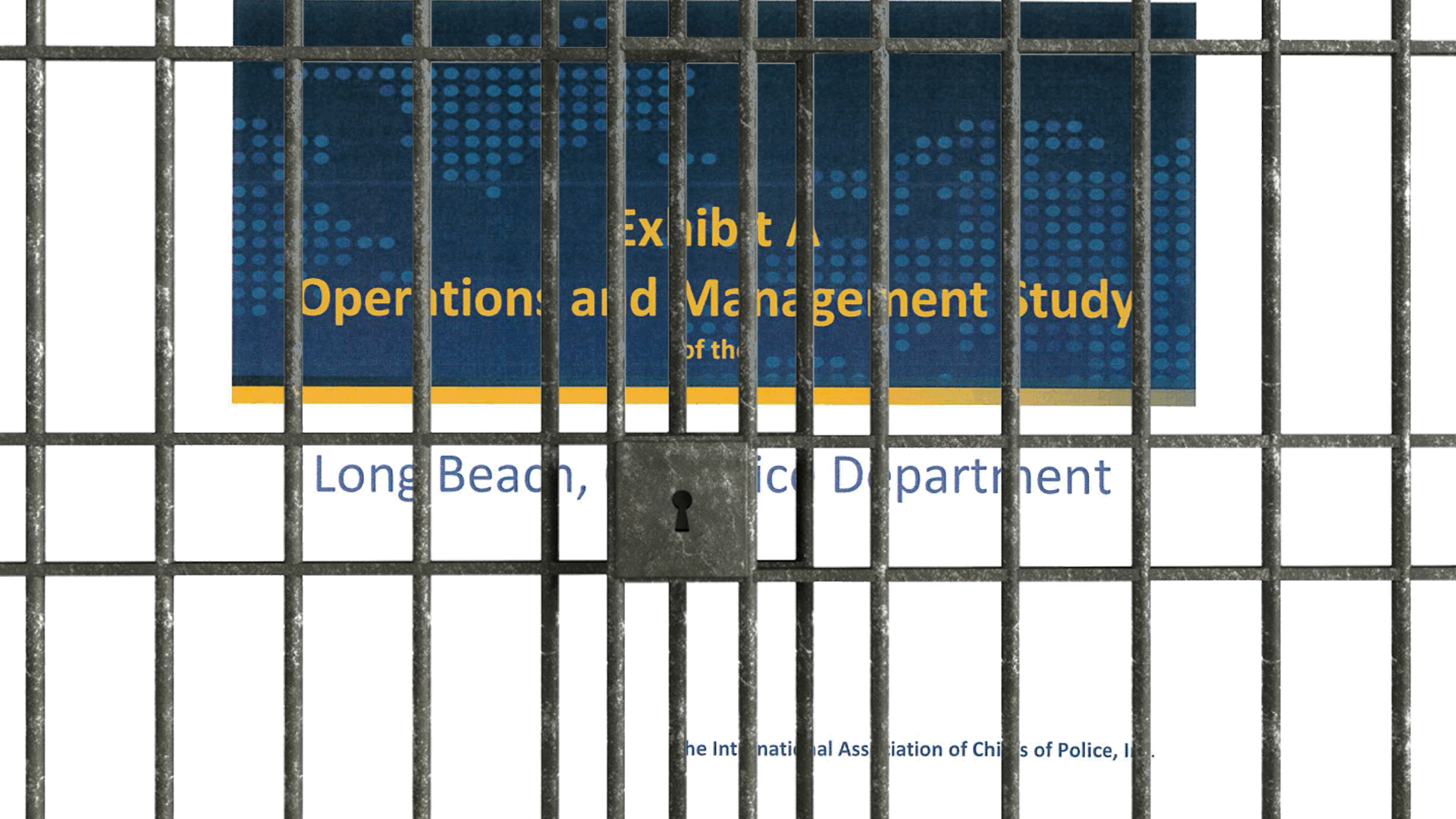Long Beach Confidential: Assessment of Police Department Kept Under Wraps Since 2018 Could Soon Be Made Public
12 minute readAn assessment of the Long Beach Police Department that has been shrouded in mystery since the project was abruptly cancelled in 2018, just as it was being finalized, may finally be released to the public.
Currently, only three parties are known to have a copy of the 124-page report, which is in draft form and deemed so confidential that it is under a federal protective order, according to court filings. The International Association of Chiefs of Police (IACP), the organization that conducted the assessment, maintains the original copy.
In March, a judge granted a subpoena for the assessment filed by attorneys for Christopher Williams, who has alleged in a federal civil rights lawsuit that LBPD officers broke his elbow during an unlawful arrest.
As part of the subpoena, a third courtesy copy was also sent to the City Attorney’s Office, court filings show.
The document was put under seal to protect “certain information that may be subject to the official information privilege, law enforcement privilege and the right to privacy,” according to the protective order, which stipulates that any copies produced must be destroyed or returned when the case is over.
Known officially as the “Operations and Management Study of the Long Beach Police Department,” the city commissioned a team of consultants from the IACP to conduct the in-depth review of the LBPD in 2017, which was to be made public upon completion. However, the city abruptly cancelled the contract the following year after paying half of the $96,000 bill and blaming project delays on the IACP.
This “comprehensive and independent assessment” of the LBPD consisted of interviews with agency employees, two public input sessions, a community survey, and analyses of departmental data and policies, according to a proposal the IACP provided to the city. The end product was to include recommendations on how the department could improve.
Now, a recent memo from City Manager Tom Modica to the city’s councilmembers and the mayor, first reported on by Columnist Stephen Downing of the Beachcomber, indicates that the document, long-sought-after by some members of the media, could soon see the light of day.
“Given recent events and the City’s ongoing commitment to be fully transparent, but still comply with the law, City leadership has directed the City Attorney’s Office to seek to have the protective order lifted—or to otherwise reach agreement with the necessary parties to authorize release of the draft report—as soon as possible,” Modica wrote.
The memo repeats the city’s original claim that the project was cancelled because the IACP did not complete the report in a timely manner. On February 11, 2019, when it was first announced that the project had been cancelled, the LBPD issued a statement saying that the department and the IACP had mutually agreed to walk away from the project and that “unforeseen delays during the data collection process” prompted the assessment’s cancellation, adding that the report had “lost its applicability” because of the delays.
That same day, the Long Beach Post reported a similar line via two unnamed law enforcement sources: “The LBPD had provided all the information the IACP asked for but the department was nevertheless left in limbo for months.”
But some have called this claim into question, including an attorney in another federal civil rights case against the city who is currently in the midst of a legal battle to gain access to the report. Attorney Shirin Buckman wrote in court documents filed in May that she was skeptical of the city’s contention that the project was cancelled simply because of a delay in delivery. “Plaintiff has a strong basis to believe that the excuse of ‘delay’ is a pretext for a cover up of data that may be damaging to the Long Beach Police Department and the City,” wrote Buckman, whose clients are alleging the LBPD’s fare evasion enforcement is racially biased.
In his aforementioned memo, Modica wrote that neither the LBPD nor city management has reviewed the draft report in detail and are “unaware of the data in the report and the conclusions.” He also denies that the city improperly withheld the report.
However, public records obtained by FORTHE Media reveal that LBPD brass was briefed on the findings of the project by the IACP team in late 2018 prior to the project being scrapped. The emails and other documents further suggest that the cancellation did not go down as amicably or straightforwardly as the city has characterized it. The records also hint at what might be contained within the report.
‘UNNERVED’
The project kicked off on July 31, 2017. That day, IACP personnel first met with LBPD officials and later that evening they held the first of two public input sessions at the Scottish Rite Center. About 50 people showed up.
Concerns raised at the meeting included the outsized political influence of the Long Beach Police Association, racial profiling by officers, and “abuse of power” by officers in North Long Beach, according to social media posts by attendees. The Long Beach Press-Telegram reported at the time that the “dwindling number of officers currently on city streets” was also a common theme among those in attendance.

Attendees aired their grievances about police during a listening session put on by IACP and LBPD officials at the Scottish Rite Center on July 31, 2017. Courtesy Bishop Guillory via Facebook.
The project chugged along for the next year but began to hit some snags in the Fall of 2018.
In emails, LBPD command staff checked in with the IACP various times about the delivery date.
“I am following up on a voicemail I left today, regarding the status of the IACP management study for LBPD and the comprehensive draft we expected to receive by September,” wrote then-Deputy Chief Wally Hebeish to then-IACP Program Manager Amanda Burstein in an email in late October.
The following month, then-IACP Project Manager Karen Offringa wrote to then-Cmdr. Michael Lewis that they had completed their data analyses—calling into question the LBPD’s statement that delays in the “data collection process” prompted the cancellation. Offringa informed Lewis that researchers had uncovered high monthly patrol counts above what is authorized by the department, along with anomalous spikes in the amount of reported holiday leave. The IACP sought clarifications from the department to better contextualize these findings.
But by this point, the emails suggest that the relationship between the IACP and the city had begun to fray.
That same month, Deputy City Attorney Monica Kilaita sent a notice to cure default to the IACP—essentially a letter demanding the organization resolve the project’s delay within two weeks otherwise it would be cancelled.
“As of the date of this letter, and nearly 14 months after the anticipated contract termination date, IACP has yet to complete its project, such as providing a draft report, presentation, and final report to the LBPD,” Kilaita wrote.
This marked the first time that the City Attorney’s Office had communicated with the IACP, Kilaita told FORTHE Media in an interview last year.
Tomisin Oluwole
Ode to Pink II, 2020
Acrylic and marker on paper
14 x 22 inches
Click here to check out our interview with Tomisin Oluwole, a a literary and visual artist based in Long Beach.

Instead of gunking up our site with ads, we use this space to display and promote the work of local artists.
The letter seemingly blindsided the IACP and triggered a cascade of communications between Kilaita and Gerard Panaro, an attorney representing the nonprofit.
Kilaita would not speak to the specifics of the IACP contract but said that in general, even when the terms of an agreement have been violated by a vendor, contract cancellation is considered a last resort by the city.
“If there’s any possibility to resolve any disputes on contracts, generally, typically it’s easier to resolve those prior to taking any legal action to cancel. It just depends on the facts, to be quite honest, and the circumstances,” she told us.
Eventually, the two parties came to an accord—“in the spirit of cooperation,” as Kilaita wrote in a Nov. 28, 2018 correspondence we obtained. The two parties agreed to participate in a conference call where the IACP would present the findings within its draft report to the LBPD.
During the Dec. 3, 2018 conference call, police officials asked that certain edits be made to some of the recommendations in the draft report and “discussed a timeline for those items to be completed by the first or second week of January,” according to the emails.
But following the call, things began to fall apart.
Panaro wrote to Kilaita a week later that her move to issue a legal notice had “unnerved” the nonprofit and suggested that the LBPD was being uncooperative during the final stages of the project.
“As of Fri Dec 07, I am not aware that IACP has heard back from the Long Beach Police Department regarding any further questions that the department may have with the findings outlined in the presentation. Accordingly, IACP intends to proceed with the feedback/guidance that it received during the Dec 03 call and aim to have something to the department within the first 2 weeks of January,” Panaro wrote.
He goes on to ask Kilaita to urge the LBPD to return communications from IACP staff.
“IACP cannot meet its deadlines if it does not have the cooperation of the LBPD. IACP does not want to get another default letter … If there is anything you can do to encourage the department to respond to IACP’s requests, so that IACP can do what it promised to do for the department in the Dec 03 phone call, I will appreciate that,” Panaro wrote.
But by this point, it seems the city seemed resolved to end the project.
Another phone call was scheduled, this time between Panaro and Kilaita, where she informed him that the city had decided to pull out of the agreement and a few days later, on Dec. 21, 2018, the city sent a notice of contract cancellation to the IACP.
“Many of the recommendations expressed during this update have already been addressed or are planned to be addressed by the City in the upcoming year,” Kilaita wrote in the notice, referring to the findings presented during the conference call. “Accordingly, the City wishes to cancel this contract, including receipt of any further presentation or report.”
It remains unclear why, less than three weeks after the City Attorney’s Office had agreed to draw back from cancelling the contract “in the spirit of cooperation,” it did an about face and sent a final cancellation notice to the IACP.
That same day, IACP Assistant Director of Member Engagement and Leadership Services Carl Maupin sent an email to LBPD Chief Financial Officer Maura Velasco-Ventura, saying, “The IACP does have a written report and we are prepared to submit it to the department, should you wish to receive it in the future.”
No response to that email from city officials was contained in the records we obtained. In his recent memo about the draft report, Modica said that the city did not receive a copy of the document until the recent subpoena prompted one to be sent to the City Attorney’s Office in March.
We submitted various questions to the LBPD about the assessment, including whether its findings had influenced the decision to pull the plug. However, the department declined to answer them, instead pointing us back to their Feb. 11, 2019 statement announcing the project’s cancellation.
Panaro declined a request for comment. We also attempted to speak to various former and current IACP employees who were involved in the project but no one was willing to talk.
WHY IS IT IMPORTANT?
Currently, the city is undergoing a process of collecting and analyzing data from the police department as part of the Framework for Reconciliation. Yet the IACP, an organization independent of City Hall, has already done similar work.
The proposal for their assessment requested a long list of data from the LBPD pertaining to calls for service, arrests, traffic enforcement, training hours, and officer workload.
The scope of the project also included a review of LBPD policies related to use-of-force, body cameras, and school resource officers, among other things. The culture and leadership of the department was also examined.
“The IACP will engage a team of professionals to conduct extensive onsite work, and our experienced staff will analyze the myriad data we collect for this study, including historical data, and new data created as a part of this project,” the proposal stated. “Our team will evaluate all of these data in comparison to our prior work in similar sized communities, against industry standards, and in relation to the contemporary challenges facing law enforcement today.”
With calls from the public for increased police transparency and accountability—echoed by some local lawmakers—releasing the report, even in draft form, would provide a rare under-the-hood look at the LBPD, and help inform the ongoing discussion about the future of policing in the city.
You can view and download the cache of documents that the city turned over to us related to the IACP assessment here.


 kevin@forthe.org
kevin@forthe.org @reporterkflores
@reporterkflores




